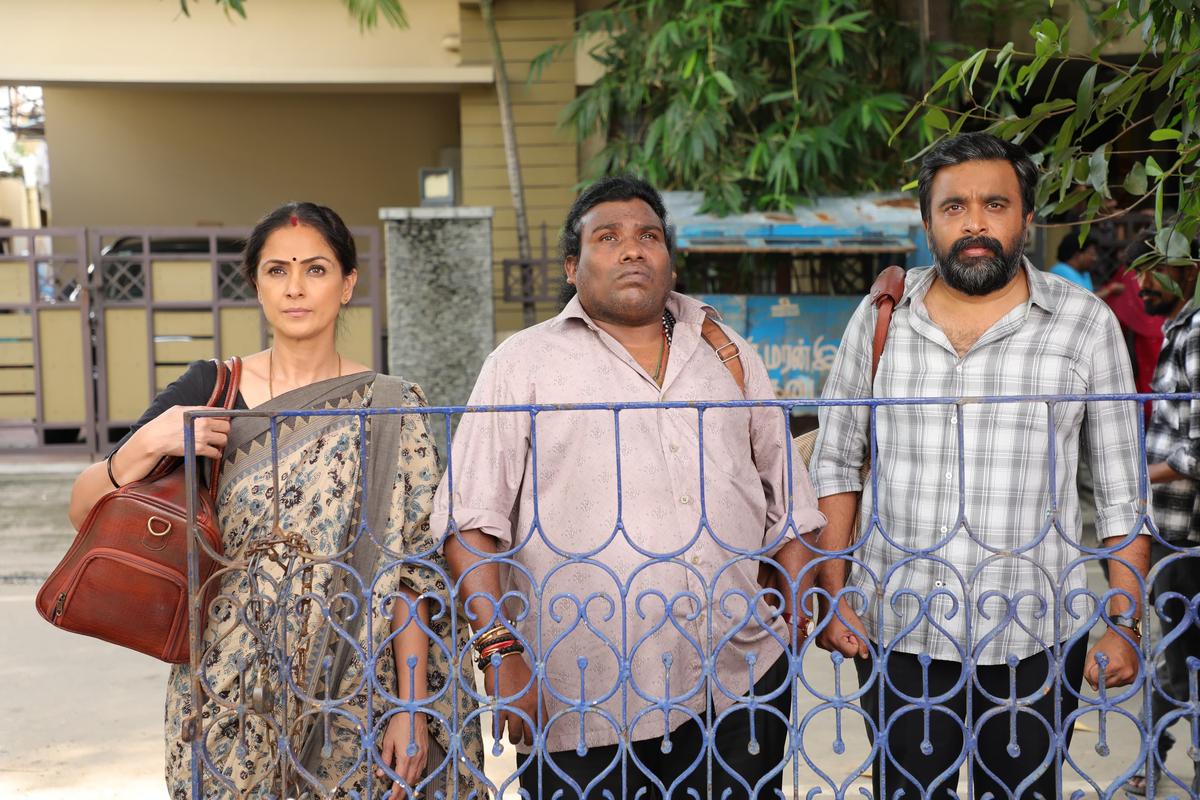At one point, well into the second hour of the Telugu film Kannappa
, Prabhas appears on screen as the deity Rudra. His extended cameo includes lines that cheekily nod to his larger-than-life image — one even references the endless speculation around his bachelorhood. These ‘meta’ touches serve as deliberate fan service, injecting energy into an otherwise uneven narrative.
It is a shame, because Kannappa, led by Vishnu Manchu, sets out with the earnest ambition of reintroducing the devotional legend to a contemporary audience. Rooted in folklore, the story follows Thinna, an atheist hunter believed to be a reincarnation of Arjuna, who transforms into a devout follower of Lord Shiva. In a final act of faith, he offers his own eyes to the deity, earning the name Kannappa.
The story of Kannappa has previously graced the Telugu screen in Bapu’s revered 1976 film Bhakta Kannappa,
which starred Krishnam Raju — uncle to Prabhas, who makes a much-publicised cameo in this new retelling. The region’s cinema is no stranger to devotional dramas; the past has offered audiences tales told with both grandeur and emotional integrity, drawing them deeply into the spiritual journeys of their protagonists.
In contrast, the core of Kannappa (2025) is overwhelmed by its ambition to stage a pan-Indian spectacle. Big-ticket names from across industries — Akshay Kumar and Kajal Aggarwal as Shiva and Parvathi, Mohanlal and Prabhas in extended cameos — are employed, but their presence does little to enrich the narrative.
The film follows Thinna (Vishnu Manchu), a tribal hunter who renounces faith after a childhood trauma.
His disillusionment with blind rituals is a theme that recurs intermittently, posing thought-provoking questions about the performance of devotion. But just as these threads begin to tug at the viewer’s curiosity, especially through sporadic divine reactions from Shiva and Parvathi, the film retreats, offering no deeper interrogation. Instead, it reverts to tracing Thinna’s transformation from sceptic to Shiva’s most ardent devotee.
Much of Kannappa has been filmed in New Zealand, in an attempt to recreate a lush, second-century landscape. While visually impressive in parts, this setting often feels dislocated from the cultural and emotional terrain of the story. The tribal skirmishes, particularly the face-off with the Kalamukha clan — whose aesthetic borrows heavily from Baahubali’s Kalakeya warriors — feel derivative and underwhelming in comparison.
This brings us to the larger problem — in the post-Baahubali era, it is not enough to go big.
S.S. Rajamouli’s films endure not because of scale alone, but because they rooted spectacle in craft — tight screenplays, innovative action sequences, and emotional stakes that resonated. In Kannappa, action set pieces are clunky, and the visual effects often distract rather than dazzle.
Beneath the film’s bloated surface, however, are flickers of genuine narrative promise. The bond between Thinna and his father (Sarath Kumar), and his continued yearning for his late mother, provide glimpses of pathos. His relationship with Nemali (Preethi Mukundhan), a warrior princess and Shiva devotee, also had potential. Preethi possesses a striking presence, but her character is reduced to ornamental appeal after a brief flash of swordplay and a couple of high-glam songs.
The film briefly explores the contrast between Mahadeva Shastri’s (Mohan Babu) orthodox puja
complete with silks and flowers — and Thinna’s more visceral form of worship, offering meat from his hunt. It is a crucial narrative pivot that could have added depth to the devotional theme, but it arrives too late and is too hurriedly resolved to have any real impact.
With a sprawling ensemble that includes veterans like Madhoo, Brahmanandam, Sapthagiri, Brahmaji, Mukesh Rishi, and Aishwariyaa Bhaskaran, the film is overpopulated and underwritten. Of these, only Sarath Kumar and Mohan Babu leave a lasting impression. Vishnu Manchu finds his footing in the emotional climax, but by then, much of the momentum is already lost.
Ultimately, Kannappa had a moving legend to build upon — a tale of unwavering faith and sacrifice. But what it needed was not more star power or visual gloss, but storytelling rooted in emotional clarity and cultural texture. In striving for grandeur, it forgets to tell the story that matters.
Kannappa is currently running in theatres.
"This Content Sponsored by Buymote Shopping app
BuyMote E-Shopping Application is One of the Online
Shopping App
Now Available on Play Store & App Store (Buymote
E-Shopping)
Click Below Link and Install Application: https://buymote.shop/links/0f5993744a9213079a6b53e8
Sponsor Content: #buymote #buymoteeshopping
#buymoteonline #buymoteshopping #buymoteapplication"








